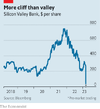Garpal Gumnut
Ross Island Hotel
- Joined
- 2 January 2006
- Posts
- 13,344
- Reactions
- 9,449
I am no expert on Australian banks.
In fact I know less than the average punter about them.
Given that the kerfuffle around SVB Financials has quite affected the share price of Canadian banks on Friday due their over-exposure to US Crypto Banks via increased buying of the latter over the last two years, I have two questions to ask.
1. Is it possible that the present contagion may spread to Australian banks next week or next month?
2. Which Australian banks are the better ones to buy should there be a big correction?
gg
ps sorry I posted this in another thread without realising it was a General Chat thread. So I've started a new thread.
In fact I know less than the average punter about them.
Given that the kerfuffle around SVB Financials has quite affected the share price of Canadian banks on Friday due their over-exposure to US Crypto Banks via increased buying of the latter over the last two years, I have two questions to ask.
1. Is it possible that the present contagion may spread to Australian banks next week or next month?
2. Which Australian banks are the better ones to buy should there be a big correction?
gg
ps sorry I posted this in another thread without realising it was a General Chat thread. So I've started a new thread.

